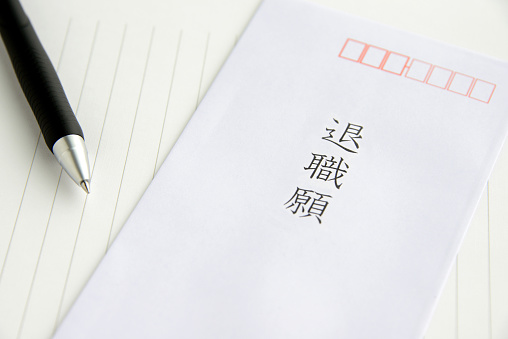Proper Etiquette For Quitting Your Job In Japan

Did you find your dream job? Great! But how do you leave your current company? Avoid the uh-ohs with this comprehensive guide on how to quit your job in Japan.
According to Alexandra Hongo, Only a few decades ago, Japan Inc. took pride in the concept of lifetime employment. Nowadays, it’s common to change jobs every three to five years, searching for new horizons, higher annual income, a better work environment or a new place to live. Regardless of the circumstances, a graceful exit in-line with Japanese employment protocols is crucial for one’s career and perhaps one of the most important factors in your work history.
Give proper notice
According to Japanese labor law, one is required to submit a resignation letter or any other type of formal notice at least two weeks before the desired last day as an employee of the company. However, in consideration of your colleagues and the actual handover process, it is recommended to announce your departure at least one month in advance.
Arrange a face-to-face meeting with your direct superior and tell him or her verbally. You should then follow up with an official handwritten letter within a week after the initial conversation. Many companies have their own policy or resignation letter format, so consult your superior about the process of submitting your formal notice.
If your company doesn’t have any specific requirements, follow the basic Japanese standard by writing the following on white paper and submitting it in an envelope. If you’re writing in English, but submitting to a Japanese employer, you can still follow the same style.
- Title: 退職届け (Taishoku todoke), Resignation Letter
- Reason: “この度一身上の都合により、令和〇年〇月〇日をもって退職致したく、お願い申し上げます” (kono tabi ishhinjou no tsugou, reiwa (year) nen (month) gatsu (day) nichi wo motte taishoku itashitaku, onegai moushi agemasu), “Due to personal circumstances, I announce that I am resigning from my current position on (date)”
- Date: 令和〇年〇月〇日, (reiwa (year) nen (month) gatsu (day) nichi, the actual submission date)
- 〇部〇課, (section) bu (role) ka, section and role followed by your name
- Signature or inkan (印鑑, personal stamp), if applicable, on the 印 sign
- 株式会社 (kabushiki gaisha), company name
- Name of your superior or CEO: 代表取締役, daihyou torishimariyaku (don’t forget to include “sama”, 様 as a mark of respect).
Nowadays, some companies are accepting printed resignation letter and you can easily find templates online where you just have to fill in personal information such as name, date and inkan or signature.
Be firm
If you’ve been a valuable member of the team, it’s likely that your boss will attempt to keep you from leaving. Be firm and direct, telling them that you’ve thought about it carefully but you’ve made up your mind.
Avoid mentioning any negativities at your current position as a reason for your leaving. If your boss senses room for negotiation, he or she is likely to find ways to make you reconsider your decision by offering different perks or ways to change what hasn’t been going well in the past. If your boss isn’t willing to let you go and if you feel that the meeting is going nowhere even though you are 100% sure about your decision, tell them you’ll think about it. The next day, tell them again that you’re grateful for their attempt to keep you and that you’ve reconsidered it, but you won’t be changing your mind.
Be honest, but positive
If you’ve been offered a better position elsewhere, if you’re looking for better opportunities or if you’re leaving due to family circumstances, don’t hesitate to speak honestly about it to your boss. If you have enjoyed working at your company and wish to stay connected to your colleagues, it’s not a good idea to give false reasons—those can eventually be revealed. In the case you’re moving to a different company in the same field, it’s likely that you may meet—or even work—with some of your former colleagues again in the future.
On the other hand, if you’re leaving as a result of mistreatment at the company, make sure that the problem is shared with your superior, but avoid getting emotional or badmouthing other colleagues. Do not blame other colleagues for your leaving unless it’s a very serious matter.
Don’t talk about your new job
Even if your superior asks you about your next company or direction, avoid disclosing too much information. Feel free to mention the field you will be working in, but don’t mention the name of your next company in order to avoid any potential trouble at your new workplace.
Create detailed hand-over documents
List all projects you have been working on, including contact information for your clients, partners, and other related individuals. Create a workflow chart for every project, and include any relevant information, including email communication and other material. Create the document for a person who has never worked on the same project before, because oftentimes the company will hire another person to fill in your position. The more detailed and organized the document is, the better.
Return all company belongings
Before you leave, make sure you return everything owned or leased by the company, including laptops, keys, cell phones, flash drives, and other items. You will also have to return your health insurance card. Don’t forget the meishi! It is considered that the collection of business cards you gathered during your job is a possession of the company—and will be of great help to the future you.
Prepare small gifts
Show your appreciation to every member of the company, or at least those you have been working with directly. Sweets, small gifts such as mugs, tea sets, a thank-you card or other similar items will be appreciated by everyone. Prepare those for your last day on the job. Usually, Japanese companies will see you off by hosting a small party and presenting you with a flower bouquet, so having something to give in return always makes a good impression. You may also be asked to give a speech, so prepare a few farewell words just in case—but keep it short and sweet.
Get prepared: useful Japanese phrases
Here are a few recommended words you may want or need to use when leaving your company.
ご相談したいことがあります。
Gosoudan shitai koto ga arimasu.
I would like to talk to you about something.
Use when: Inviting your boss for a meeting.
実は、〇〇の理由で退職(転職)することになりました。
Jitsu wa, 〇〇no riyu de taishoku (tenshoku, changing jobs) suru koto ni narimashita.
I have decided to leave/change my current position due to ______ reason.
Use when: You are breaking the news to your boss/colleague.
一日考えさせて下さい。
Ichinichi kangaesasete kudasai.
Please let me think about it for a day.
Use when: Your boss is asking you to reconsider and you are feeling that the meeting is heading nowhere.
よく考えましたが意志は変わりません。
Yoku kangaemashitaga ishi wa kawarimasen.
I’ve thought about it carefully, but I will not change my decision.
Use when: You need to be firm once and for all.
皆さまには大変お世話になりました。
Mina sama ni wa taihen osewa ni narimashita.
Thank you very much for everything.
Use when: On your last day of work during your final greeting—don’t cry!
退職届
Taishokutodoke
Formal notice of resignation
Use when: Header of your resignation letter.
このたび一身上の都合により、平成○○年○○月○○日をもって退職いたしたく、ここにお願い申し上げます。
Kono tabi isshinjo no tsugo ni yori, heisei ○○nen ○○gatsu ○○nichi wo motte taishoku itashitaku, koko ni onegaimoushi agemasu.
I announce that I have come to a decision to leave my current position on ____year ____month ____day.
Use when: Text of your formal letter of resignation.
























